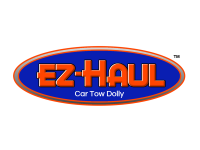Trailer Brakes
Federal regulations concerning trailers address taillights, registration, and brakes—just to name a few. All of the Tow Better Dolly™ trailers meet federal guidelines. In addition to federal legislative requirements, all 50 states have laws regarding towing vehicles and towing trailers with vehicles (vehicle combinations), but they vary from state to state. Since each state has different regulations, your choice of car tow dolly will depend on where your trailer or tow vehicle is registered—NOT where you plan on going. You do not have to meet the trailer laws of states that you plan on traveling through.
Trailer brakes are required in some states but not in others.
Some states require supplemental brakes (e.g., surge brakes, electric brakes, or portable braking systems) for trailers or towed vehicles weighing over a certain number of pounds (see the below infographic map). If this is what your state requires, then take a look at Stow -and- GO Folding Tow Dolly™ with hydraulic brakes and EZ-Haul Car Tow Dolly™ with hydraulic brakes. Stow -and- GO is equipped with drum brakes and a Demco actuator. EZ-Haul’s hydraulic braking system is powered by a UFP A-60 actuator and Trailer Buddy® disc brakes. Click on the screen below to watch a 19-second video that demonstrates how the actuator energizes our tow dolly surge brakes.
Your other options include Tow Max Heavy Duty Car Tow Dolly™ or Premiere Car Tow Dolly™, but you will need to purchase and install our after-market Car Tow Dolly Electric Brake Kit.
Other states do not have any requirements for supplemental brakes or do not require them on trailers or vehicle combinations weighing under a certain number of pounds. For motorists living in those states, take a look at our Tow Max Heavy Duty Car Tow Dolly, Premier Car Tow Dolly, or EZ-Haul Idler Car Tow Dolly™. Since these trailer dollies are not equipped with brakes, each one is a great choice.
Many states require breakaway systems.
Many states mandate the use of a breakaway system in addition to supplemental brakes. Should the trailer ever become separated from the tow vehicle, the breakaway system will deploy the brakes and stop the trailer without the assistance of the driver. Stow -and- GO and EZ-Haul Car Tow Dolly™ with hydraulic brakes are two of the best car tow dollies for RVers living in those states, or anyone living anywhere who wants the added confidence while hauling a tow dolly. The breakaway systems of both trailers are cable components of their hydraulic actuators and brakes. Click on the screen below to watch a 25-second video that demonstrates how EZ-Haul’s system sets the brakes if the vehicle combination ever separates while in transit.
This is what you need to know about the infographic map.
The weights and associated colors listed in the info graphic map below represent the weight at which a trailer, towed vehicle, or vehicle combination is required to have brakes or supplemental brakes.States with a push pin require a trailer, towed vehicle, or vehicle combination to be equipped with a breakaway system that meets the same weight requirements (or higher) as the primary or supplemental brakes.However, due to the weight of our car tow dollies (and other factors), these requirements may not apply to you.
The information in the info graphic map and “Thresholds and special requirements” section is collected from the “AAA Digest of Motor Laws” and numerous other third-party sources.It is intended as an overview and guide. Extreme effort is made to ensure the accuracy of the material, but regulations do change. So, you may need to conduct additional research to determine what your state requires.

Thresholds and Special Requirements
Alabama
An independent braking system is required over 3,000 lb.
Alaska
An independent braking system is required over 5,000 lb. A breakaway system is also required.
Arizona
An independent braking system is required over a gross weight of 3,000 lb.
Arkansas
An independent braking system is required over 3,000 lb. A breakaway system is also required.
California
Every trailer weighing over 1,500 lb. must have brakes. A breakaway system is also required.
Colorado
Brakes are required on trailers above 3,000 lb. A breakaway system is also required.
Connecticut
Brakes are required on trailers above 3,000 lb. A breakaway system is required on trailers with agross vehicle weight rating (GVWR) of 10,000 lb. or more.
Delaware
Brakes are required on trailers above 4,000 lb.Two separate means of applying brakes are also required.
District of Columbia
Brakes must be placed on all wheels, except for trailers that do not exceed 3,000 lb., as long as the total weight on and including the wheels of the trailer does not exceed 40% of the gross vehicle weight (GVW) of the towing vehicle, and the vehicle combination can meet the district’s stopping requirements.
Each trailer weighing more than 3,000 lb. must be equipped with brakes acting on all wheels that will be applied automatically and promptly, and remain applied for at least 15 minutes upon breakaway from the towing vehicle.
There must be a manually controlled device for applying and releasing the brakes that is readily operable by a person seated in the driving seat.
Florida
Brakes are required on trailers above 3,000 lb. Two separate means of applying trailer brakes are required when towing a vehicle with air brakes.
Georgia
Every trailer of 3,000 lb. GVWR or more must be equipped with brakes on all wheels.
Hawaii
An independent braking system is required over 3,000 lb.
Idaho
An independent braking system is required over 1,500 lb. A breakaway system is also required.
Illinois
An independent braking system is required over 3,000 lb. A breakaway system is also required.
Indiana
A trailer weighing 3,000 lb. must have brakes. A breakaway system that will stop the vehicle-in-tow from the tow vehicle is required.
Iowa
A trailer with a gross vehicle weight (GVW) of 3,000 lb. must have brakes. It must also be equipped withan auxiliary means of stopping the trailer from the tow vehicle.
Kansas
Any vehicle combination (towcombination or vehicle combination) must be able to stop in 40 feet at 20 mph.
Kentucky
There is no law specifically requiring brakes on any passenger car trailers, regardless of weight. However, vehicles singularly or in combination must be able to stop within distance specified by the statute.
Louisiana
A trailer weighing 3,000 lb. must have brakes. It must also be equipped with an auxiliary means of stopping the trailer from the tow vehicle.
Maine
A trailer with a gross weight of 3,000 lb. must have brakes.
Maryland
Trailers weighing more than 3,000 lb. must have brakes on all wheels and must have a breakaway system.
Massachusetts
Trailerswith an empty weight of more than 10,000 lb. must be equipped with air or electric brakes.
Michigan
An independent braking system is required when the gross weight exceeds 15,000 lb.
Minnesota
A trailer with a gross weight of 3,000 lb. must have brakes. Trailers weighing more than 6,000 lb. must have breakaway brakes.
Mississippi
Brakes are required on trailers above 2,000 lb. A breakaway system is also required.
Montana
A trailer with a gross weight of 3,000 lb. must have brakes.A breakaway system is also required.
Nebraska
All recreational trailers with a gross loaded weight of 3,000 lb. or more but less than 6,500 lb. must be equipped with brakes on at least 2 wheels.
All trailers with a gross loaded weight of 6,500 lb. or more must be equipped with brakes on each wheel. The brakes must be operable from the driving position of the towing vehicle. Such trailers must also be equipped with a breakaway, surge, or impulse switch on the trailer so that the trailer brakes are activated if the trailer becomes disengaged from the towing vehicle.
Nevada
Every trailer weighing over 1,500 lb. must have brakes. A breakaway system is required on trailers weighing more than 3,000 lb.
New Hampshire
A trailer with a gross weight of 3,000 lb. must have brakes.The state requires any vehicle combination to stop in 30 feet at 20 mph.
New Jersey
A trailer with a gross weight of 3,000 lb. must have brakes.A breakaway system is also required.
New Mexico
Trailers weighing more than 3,000 lb. must have brakes.
New York
Trailers weighing more than 1,000 lb. must have brakes.
North Carolina
House trailers weighing more than 1,000 lb.and every semitrailer, trailer, or separate vehicle attached by a drawbar or coupling to a towing vehicle of at least 4,000 lb. must have brakes.
North Dakota
Every trailer operated at a speed in excess of 25 mph must have safety chains or brakes adequate to control the movement of and to stop and to hold such vehicle. The safety chains or brakes must be designed so that they can be applied by the driver of the towing vehicle from its cab, and must be designed and connected so that in case of an accidental breakaway the brakes are automatically applied.
Ohio
Trailers with an empty weight of more than 3,000 lb. require brakes.
Oklahoma
Trailers with a gross weight of 3,000 lb. must have brakes.
Oregon
An independent braking system is not required. However, vehicle combinations must be able to stop within legal limits. Every motor vehicle and vehicle combination, except motorcycles and mopeds, must be equipped at all times with a parking brake system.
Pennsylvania
A trailer with a gross weight of more than 3,000 lb. must have brakes. A breakaway system is also required.
Rhode Island
A trailer with a gross weight of more than 4,000 lb. must have brakes. A breakaway system is also required.
South Carolina
A trailer with a gross weight of more than 3,000 lb. must have brakes. A breakaway system is also required.
South Dakota
A trailer with a gross weight of more than 3,000 lb. must have brakes. A breakaway system is only required in vehicle combinations of more than two.
Tennessee
Every trailer or semitrailer of a gross weight of 3,000 lb. or more must be equipped with brakes that may be applied by the driver of the towing vehicle from the cab and must be of a design such that in case of an accidental breakaway of the towed vehicle, the brakes will be automatically applied.
Texas
A trailer weighing 4,500 lb. must have brakes.
Utah
Every motor vehicle and every vehicle combination must have a service braking system which will stop the vehicle or combination within 40 feet from an initial speed of 20 mph on level, dry, smooth, hard surface.
Every motor vehicle and vehicle combination must have a parking brake system adequate to hold the vehicle or combination of any grade on which it is operated under all conditions of loading on a surface free from snow, ice, or loose material.
Vermont
A trailer with a gross weight of more than 3,000 lb. must have brakes. A breakaway system is also required.
Virginia
A trailer with a gross weight of more than 3,000 lb. must have brakes.
Washington
A trailer with a gross weight of more than 3,000 lb. must have brakes.
West Virginia
A trailer with a gross weight of more than 3,000 lb. must have brakes. A breakaway system is also required.
Wisconsin
Any traileror other towed vehicle with a gross weight of 3,000 lb. or more must have brakes.
Wyoming
Every motor vehicle and every vehicle combination must have a service braking system which will stop the vehicle or combination within 40 feet from an initial speed of 20 mph on level, dry, smooth, hard surface.
Every motor vehicle and vehicle combination must have a parking brake system adequate to hold the vehicle or combination of any grade on which it is operated under all conditions of loading on a surface free from snow, ice, or loose material.
NOTE:The information above and in the above infographic were collected from the “AAA Digest of Motor Laws” and other third-party sources. Although Tow Better Dolly™ and TowBlazer, Inc. make every effort to provide accurate and complete information, we make no warranty, expressed or implied, and assume no legal liability or responsibility for the accuracy or completeness of any information contained herein. It is the absolute responsibility of the trailer operator to obtain and adhere to the local and state laws in which he or she lives.





